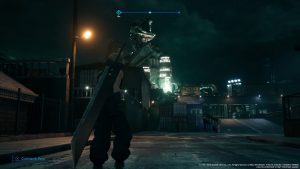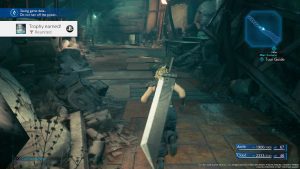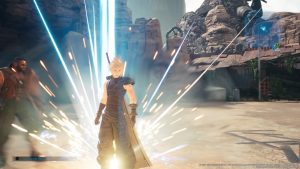More Remix Than Remake
Final Fantasy VII is one of the best roleplaying games of all time. It’s a title that brought the JRPG genre to Western audiences in a big way and introduced large numbers of players to a style of game mainstream audiences hadn’t really experienced before 1996. With a pitch-perfect story, some wonderful show-don’t-tell elements and an action packed adventure full of interesting themes, FF7 grew to become a worldwide phenomenon.
It’s a game that skyrocketed Squaresoft (before its merger to become Square Enix) to the big leagues and brought with it several successful follow-ups, but none that ever quite reached that same pinnacle of greatness achieved by Final Fantasy VII.
When it was announced that Final Fantasy VII was being remade back in 2015 after years of whispers in the gaming community, fans around the world waited eagerly for this long-awaited title. As someone whose unashamedly played the original at least four times on different consoles (PS1, PC, PS3 and PS4), I had a lot of reservations around the Remake and in particular, just how this episodic format would work. Fast forward five years and the Remake is finally here.
For those unaware, although officially titled Final Fantasy VII Remake this is only part 1 of the story. Taking place exclusively in the industrialized city of Midgar, Final Fantasy VII’s opening chapter has been stretched, fleshed out and given plenty of attention to make for a solid 30/35 hour experience. Essentially the story beats are the same – the first 17 chapters are at least – and see you take on the role of Cloud, an ex-SOLDIER and mercenary hired by the terrorist group Avalanche.
Desperate to stop the evil Shinra Corporation from leeching the planet of its life-force to turn into MAKO energy, you team up with enigmatic hot-head Barrett, your childhood friend Tifa and a whole host of familiar friends to stop Shinra. Only, what you find is far more horrifying than you could have imagined, leading to an action-packed climax and a massively deviating final chapter. It also throws a lot of questions into the mix surrounding just how in the world Part 2 follows on from here.

I mentioned earlier in the review about show don’t tell and it’s something the FF7 Remake has a serious problem with. From the introduction of Sephiroth in the early chapters of the game to glamorous fighting cut-scenes that could have been better served as an actual in-game battle, the FF7 Remake has some questionable narrative choices peppered in around some gorgeous aesthetics and amazingly nostalgic story beats.
Make no mistake about it, FF7 Remake is absolutely stunning. Environments are well-rendered, faithful to the original locations and feature a lot of detail in the textures. While the draw distance is a bit of an issue at times, especially against the detailed backdrops, it’s easy to look past this given how good everything looks. Character models are faithful, well drawn and animated beautifully while the cut-scenes use a ridiculous amount of pixels to make some of these cinematics near photo-realistic. It really is an amazing feat and when it comes to graphical fidelity, Remake is unrivaled.
Traversing the world is much more akin to later Final Fantasy titles like X and XIII, with tunneled routes and simple A to B pathways with little deviations. Enemies can be spotted on the map this time rather than the iconic whoosh of a random encounter in the original and there’s plenty of interactive elements and obstacles to overcome.
While you can run by holding down R2 (or the left analog stick) these decisions are sometimes left up to the computer, as you’re forced to walk during in-game dialogue and other times forcibly stopped while characters investigate something of interest.

Being made to walk (not run) up 40 flights of stairs or slowly crawling under pieces of wreckage with 4 second animations every time are not fun and feel like complete time-wasters in a game that already has had its run-time artificially lengthened. This pacing is something the game and narrative constantly struggles with and early on, expect a new tutorial or cut-away dialogue every time you encounter something new – including how to press triangle and open a chest.
It’s particularly frustrating because these moments take the shine off some of the beautiful and charming moments that skyrocket this game to controlled bursts of excellence.
From the moment you start your last bombing run right the way through to the end of the sewer section, Remake shines and delivers some of its best goods during these chapters. There’s an abundance of humour, the familiar story beats are intact and there’s some wonderful nods to the original game that make for some of the best gaming moments of 2020. Seeing Wall Market in all its glory and the cacophony of different tunes and excited chatter from residents floating through the air as you run by really helps give these towns a feeling of being actual living, breathing places.
There’s a lot to like here and hearing Barrett hum the Victory Fanfare music or seeing the Save Point icon on the Shinra benches (used for recovering HP and MP in-game) are wonderful little nods for fans of the original. When the story deviates and starts adding new characters, elements and ideas however, Remake fails to inject a lot of them with the same gravitas and depth to match the original moments.
Alongside the main narrative are several chapters that feature a slew of Side Quests to complete. Those looking for a Witcher 3-level of depth to these will almost certainly be left disappointed, with almost all revolving around fetch or kill missions. There are a couple of mini-games in here too, most of which designed to try your patience thanks to some clumsy and ill-conceived mechanics, and the Coliseum makes a welcome return as well.

One of the biggest overhauls since the original is the Battle system which does take some getting used to, and certainly has its fair share of problems. Playing out in real-time, attacks are carried out through pressing square which helps speed up your ATB bar, essentially acting as your go-to metric for performing actions beyond simple attacks.
Charging up a bar lets you unleash different abilities, items or magic in battle, and switching partners can be done with L2 and R2 to complete this same cycle of attacks. When doing so, the battle will slow down considerably offering up a chance to take your time in choosing the right action to perform, and strategically execute them without being interrupted by an enemy attack.
What’s particularly interesting here though is just how different every character feels and controls in battle. Tifa’s strengths lie in her speed and getting up close and personal to enemies. Cloud is a decent all-rounder but has some lovely sword attacks while Barrett and Aerith are better served at a distance, pummeling enemies with magic or long-range attacks while buffing the party.
Red XIII is here too but disappointingly unplayable and there’s a couple of familiar faces that show up in cameo roles but aren’t playable just yet, making it relatively easy to get accustomed to these four different characters and how they play out in battle. There’s a fair amount of depth to this system too and although some may lament the aforementioned Interrupt mechanic (especially when throwing a phoenix down on a partner or trying to hit a Limit Break), this actually adds to the experience given you can sometimes do the same to enemies.
These skirmishes are made a little more troublesome than they should be thanks to a cumbersome camera that takes some getting used to. This is something you’ll be wrestling with the whole game, especially for flying enemies, and the lock-on aiming oftentimes skews off to the side, forcing you to manually move the camera with the right analog stick.

The Final Fantasy 7 soundtrack is something that’s certainly a big part of the original game’s success and here the audio gets a familiar upgrade, with a lot more of an orchestral feel. We’ll have more to say about that in a separate review when it’s released officially but suffice to say a lot of the remixed pieces do well to capture the new feel and ideas in the game.
The materia system is back too and much like the original, there’s a fair amount of strategy that goes into choosing the right set-up for each player. These orbs can be collected throughout the game, dotted around the landscape and even obtained through completing battle intel reports (one of the long-running side-quests). There’s a good amount of depth to this but expect to be pretty beefed up by the end boss fight, especially if you’ve been levelling up your material and weapons along the way.
Upgrading weapons is a nice inclusion here too, allowing you to apply SP points to each chosen weapon to improve its stats. From attack power and MP extensions to percentage boosts for different magic types, there’s a solid amount of tweaking you can do with this to find a set-up that works for your party. To be honest, you’ll probably settle on a familiar set-up pretty early on and when you find what works for you, it’s unlikely you’ll switch unless you’re gunning to unlock all the weapon abilities for every character.
The Final Fantasy 7 Remake does both the best and worst things to enhance the original. The battle system is a great step forward despite a cumbersome camera and the world building is second to none. Characters are faithful to their original counterparts, boasting some wonderful voice acting from all involved and some of the locations are a joy to revisit all these years later.
While the nostalgic slices of the original game are easily the highlight of the entire 30/35 hour experience, Remake is let down by inconsistent pacing, narrative and design choices, ones that have serious ramifications for the second part to come.
Whether Nomura can pull this off and deliver a memorable second part remains to be seen but for now, the FF7 Remake is a game that’ll live and die by its ending. It’s a game that could turn out to be a work of genius to come or another convoluted mess like Kingdom Hearts III. Let’s hope it’s the former!
Click Here To Go Back To Our Game Reviews
All of our videogame reviews are also featured on OpenCritic
-
Verdict - 7/10
7/10
